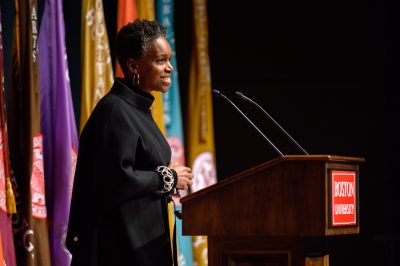The Trustees of Boston University announced the appointment of Melissa Gilliam at the Tsai Performance Center Wednesday as BU’s 11th president. She will be the first female and first Black president of the University.

Gilliam, who is currently The Ohio State University’s executive vice president and provost, will take over for interim president Kenneth Freeman on July 1, 2024.
“It is difficult to express my joy and gratitude for this opportunity to join Boston University’s extraordinary global community,” Gilliam said. “BU is a world class university and it is a tremendous privilege to be invited to lead this institution.”
Gilliam previously served as vice provost at the University of Chicago, where she founded the Center for Interdisciplinary Inquiry and Innovation in Sexual and Reproductive Health. She also taught obstetrics and gynecology and pediatrics at the University in addition to researching adolescent health and education.
“I believe deeply in people and human potential,” Gilliam said.“I’m working with you to shape a shared vision for the future of Boston University.”
BU Board of Trustees Chair Ahmass Fakahany said the search committee was committed to securing “the best” in a “highly competitive landscape.”
“What is important and what I want to share with you is that in addition to her keen intellect is her heart and character,” said Fakahany, who introduced Gilliam as the next president. “She understands the history of Boston University. She very much wants to be here and is committed.”
Former BU president Robert Brown, BU Police Department Chief Robert Lowe, BU interim president Kenneth Freeman and others gathered to watch the ceremonial announcement, which was also live streamed.
Gilliam also held the position of dean of diversity and inclusion for the Biological Sciences Division at University of Chicago Medicine.
“There are so many reasons that I admire Boston University,” Gilliam said. “From its inception, Boston University has had a policy of inclusion regardless of race, religion, gender, country of origin and from that inclusion, an inspired history of firsts.”


















































































































